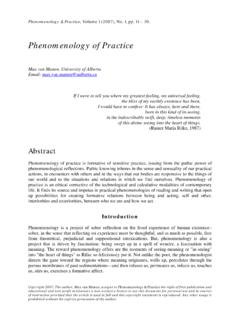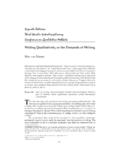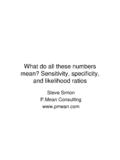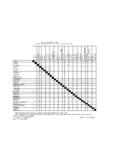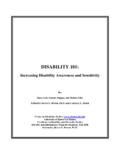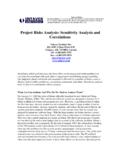Transcription of Pedagogical Sensitivity and Teachers Practical …
1 1 Peking University Education Review (2008) Pedagogical Sensitivity and Teachers Practical Knowing-in-Action Max van Manen University of Alberta Abstract In everyday life in classrooms, the thousand and one things that Teachers do, say, or do-not-do, all have Practical Pedagogical significance. Not only the objectives or goals of education but also the means and methods used all have Pedagogical value and consequences for teaching and learning. This text explores the nature and significance of the Practical forms of knowledge that Teachers enact in (inter)active situations with their students. teacher Practical knowing-in-action requires Pedagogical Sensitivity and is described in terms of thoughtfulness and tact, embodied and pathic understanding.
2 Teaching can be a complex enterprise when Teachers challenge the students to think independently and critically about their learning. Teaching can be risky for Teachers who are willing to make themselves vulnerable by engaging students in activities that are not always clearly predictable and controllable. Any true teaching moment can pose innumerable questions to the teacher : What is in the best interest of this child? What is appropriate and what is less appropriate for these students? What should the teacher say in this or that situation? How should a teacher enter this classroom? How should one close the door? How and what atmosphere is created by the many seemingly innocuous things that Teachers and students do?
3 How should a teacher adjust his or her tone of voice in different situations and in different circumstances? How does the teacher encourage the children? Where does he or she stand, sit, or move around in the classroom? What speech climate is created? When should a teacher speak? When should a teacher be silent? What is good and what is not good? What meaning is expressed in the teacher s gestures? Which teaching techniques and what evaluation approaches are pedagogically more appropriate in particular circumstances? What type of experience is good for children here? And what material is less good for them? Should this difficult subject matter be taught? Should it be made easier? How easy? What kind of difficulty is good for this student?
4 And what about that student? How much pressure is too much? What kind of discipline is right in this situation? And what expectations may be inappropriate? What should one do now? Any of these questions may be posed or occur to Teachers at any time in their teaching. However, while interacting with their students and while presenting their lessons, Teachers usually do not have the time or inclination to truly reflect on any of such questions. Reflection in action is limited to an (inter)active thoughtfulness. So if such questions do present themselves then they usually occur afterwards, upon reflection on the events and the situations in which the 2 teacher found him- or herself. In real situations the Teachers must constantly and instantly act in a manner that hopefully demonstrates a thoughtful considerateness.
5 So what is the nature of the Practical knowledge that Teachers enact when they interact with the students they teach? And how do students experience the Practical actions of Teachers ? Let us look at an example of an ordinary classroom situation where a teacher is involved in a mathematics lesson. Here is how a student describes a moment where he is asked by the teacher to solve a math problem: Jeff, this problem is a real brainer. You think you can tackle it? I walked to the board at the front of the class and quickly did the equation. This was a new school for me and I had no trouble with any of the subjects. The teacher looked at my solution. That s a good shortcut, she said. And as she started to explain the procedure, she joked: Aren t we lucky to have a genius among us!
6 I sort of smiled but as I walked back to my seat near the back I distinctly heard muffled name-calling and hissing. Some of the students smirked or rolled their eyes, others looked outright hostile. I realized that things were different in this school and that doing well was not considered cool. I was a bit amazed how in my new school most students would shun you if you seemed to be trying to do well in your studies. Gradually I learned the art of pretending to be dumb and dull. It is not surprising perhaps that many stories that students tell have to do with approval, being noticed, feeling special. Giving encouragement and positive feedback is one of the most common gestures expected from Teachers in classrooms.
7 It means that we prize, value, and esteem someone for something. Moreover, supportive commendation is supposed to build self-esteem, trust, and confidence in students. But obviously giving praise is not without danger. It is important that Teachers understand the positive as well as the possible negative consequences of praising students. A compliment should be meaningful and should not be granted indiscriminately because, if given too readily and too freely it may lose its significance. Yet, many students no doubt deserve commendation for a variety of reasons. And on occasion it is possible that only one student or only a few students stand out for their accomplishments. For this very reason praise creates dilemmas.
8 Pedagogical sensitive Teachers would like to recognize all students, especially if they make good efforts, but the practice of praising everyone equally in all instances is self-defeating. And sometimes Teachers want to honor a single student, but they may not always realize that such acclaim may create difficult situations for the student. This is how a high school student describes such a situation: 3 Mr. Young made a big production of his disappointment. He went on and on exclaiming his amazement at the mistakes people had made on the science test. "My God, did I do such a poor job at explaining this stuff to you people? I know there is nothing wrong with your brains. And, you What happened?" It was obvious that he did not really expect an answer.
9 And nobody tried. The class was completely quiet. None dared to crack a joke. Most kids got a failing or near failing mark. Only two or three students barely made over 60 percent. Again Mr. Young blew his cool, uttering his disgust while he walked around the room, demonstratively placing each paper in front of its owner, as if he could not quite believe it, as if he wanted to verify each case. Most students sort of looked sheepishly. I feared my turn, feeling already ashamed. A sense of doom seemed to be hovering over the class. I tried to tell myself inwardly that this was not the end of the world. I would do better next time. When the teacher finally reached my desk, he stopped and suddenly changed his tone of voice.
10 The shift was so dramatic that I am sure everyone in class startled. All eyes were on me. But the teacher 's face lit up and I heard him say, with an air of approval: "Oh, thank God, there is one amongst you who has caught on. It goes to show that there is still " He waved my test paper above his head, like a silly flag, before he placed it solemnly in my hand. "Good for you, Siri, not a single mistake. A perfect mark!" I scarcely could maintain my composure. I had expected the worst and was awarded the best. I did not need a mirror to know that my face was blushing red. The class was still strangely silent. No one uttered a word while the teacher walked back to the front of the room. I kept my face turned down, staring at my test paper.
